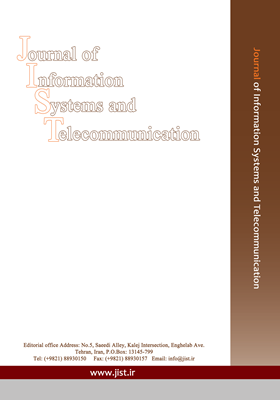Reallocation of Virtual Machines to Cloud Data Centers to Reduce Service Level Agreement Violation and Energy Consumption Using the FMT Method
الموضوعات : Cloud computing
Hojjat Farrahi Farimani
1
,
Davoud Bahrepour
2
,
Seyed Reza Kamel Tabbakh
3
,
reza Ghaemi
4
![]()
1 - Neyshabur Branch Islamic Azad University
2 - Mashhad branch Islamic Azad University
3 - Mashhad branch Islamic Azad University
4 - Quchan Branch Islamic Azad University
الکلمات المفتاحية: Cloud Computing, , Energy Consumption, , Service Level Agreement Violation, , Virtual Machine Consolidation, ,
ملخص المقالة :
Due to the increased use of cloud computing services, cloud data centers are in search of solutions in order to better provide the services demanded by their users. Virtual machine consolidation is an appropriate solution to the trade-off between power consumption and service level agreement violation. The present study aimed to identify low, medium, and high load identification techniques, as well as the energy consumption and SLAv to minimize. In addition to the reduced costs of cloud providers, these techniques enhance the quality of the services demanded by the users. To this end, reallocation of resources to physical hosts was performed at the medium load level using a centralized method to classify the physical hosts. In addition, quartile was applied in each medium to reduce the energy consumption parameters and violation level. The three introduced SMT - NMT and FMT methods for reallocation of resources were tested and the best results were compared with previous methods.The proposed method was evaluated using the Cloudsim software with real Planet Lab data and five times run, the simulation results confirmed the efficiency of the proposed algorithm, which tradeoff between decreased the energy consumption and service level of agreement violation (SLAv) properly.
[1].A. Beloglazov and R. Buyya, "Optimal Online Deterministic Algorithms and Adaptive Heuristics for Energy and Performance Efficient Dynamic Consolidation of Virtual Machines in Cloud Data Centers", Concurrency and Computation: Practice and Experience, vol. 24, 2012, pp.
[2].A.Varasteh and M. Goudarzi , "Server Consolidation Techniques in Virtualization Data Centers : A Survey", IEEE System Journal ,June 2017.
[3].O.Sharma , H.Saini," VM Consolidation for Cloud Data Center using Median based Threshold Approach" Twelfth International Multi-Conference on Information Processing-2016 IMCIP,2016.
[4].A.Horri, M.S.Mozafari and G.Dastghaibyfard," Novel Resource Allocation Algorithms to Performance and Energy Efficiency in Cloud Computing", The Journal of Super Computing, vol. 69(3), pp. 1445–1461, 2014.
[5].S.Shaw and A.Singh, "Use of proactive and reactive hotspot detection technique to reduce the number of virtual machine migration and energy consumption in cloud data center", Computers & Electrical Engineering, 2015.
[6].Z.Zhou , Z.Hu and K.Li , " Virtual Machines Placement for Both Energy-Awareness and SLA Violation Reduction in cloud Data Centers " , Hindawi Publishing Corporation Scientific Programming , vol . 2016 , ID 5612039 , March 2016.
[7].R.Buyya, R.Ranjan and R.N Calleiros, "Modeling and simulation of scalable cloud computing environment and the CloudSim Toolkit: challenges on opportunities ", in proceedings and simulation (HPCS; 09), pp. 1-11, Leipzig, Germany, June 2009.
[8].A. Beloglazov, J. Abawajy and R. Buyya, “Energy-aware resource allocation heuristics for efficient management of datacenters for Cloud computing,” Future Generation Computer Systems, vol. 28, no. 5, pp. 755–768, 2012.
[9].Z. Zhou, Z.G. Hu, T. Song, and J.-Y. Yu, “A novel virtual machine deployment algorithm with energy efficiency in cloud computing,” Journal of Central South University, vol. 22, no. 3, pp. 974–983, 2015.
[10].R.Yadav , W.Zhang , O.Kaiwartya , P.R.Singh , I.A.Elgendy and YU.Tain , “Adaptive Energy-Aware Algorithms for Minimizing Energy Consumption and SLA Violation in Cloud Computing ” , Special Selection on smart Caching ,Communications , Computing and Cybersecurity for Information-Centric Internet Of Things ,DOI 10.1109/Access.2018.2872750 ,Vol 6 ,October 2018.
[11].E. Feller, C. Morin, and A. Esnault, “A case for fully decentralized dynamic VM consolidation in clouds”, in Proc. IEEE 4th Int. Conf. Cloud Compute. Technol. Sci., Dec. 2012, pp. 26_33,2012.
[12].J. Xue, F. Yan, R. Birke, L. Y. Chen, T. Scherer and E. Smirni, “PRACTISE: Robust prediction of data center time series”, in Proc. 11th Int. Conf. Netw. Service Management (CNSM), Nov. 2015, pp. 126_134,2015.
[13].L.Lianpeng, et al,“SLA-Aware and Energy-Efficient VM Consolidation in Cloud Data Centers Using Robust Linear Regression Prediction Mode”, IEEE Access, 2019, 7: 9490-9500,2019.
[14].K. S. Park and V. S. Pai, CoMon: “ A Mostly-Scalable Monitoring System for PlanetLab ”, ACM SIGOPS Operating Systems Review, pp. 65–47, 2006.
[15].J. Shuja, S. A. Madani, K. Bilal, Kh. Hayat, S. Ullah Khan, Sh. Sarwar, “Energy-efficient data centers”, Computing 94(12): pp. 973- 994, 2012.
[16].C. Rodrigo, R. Rnjan, C.AF. De Rose, R. Buyya, Cloudsim: “A novel Framework for modeling and simulation of cloud computing infrastructure and services”. arXiv preprint arXiv , 2009:0903.2525,2009.
[17].C.Cardosa, M. Korupolu, and A. Singh., “Shares and utilities based power consolidation in virtualized server environments”, In Proceedings of IFIP/IEEE Integrated Network Management (IM), 2009.
[18].G.L. Stavrinides, H.D. Karatza, “The effect of workload computational demand variability on the performance of a SaaS cloud with a multi-tier SLA” in: Proceedings of the IEEE 5th International Conference on Future Internet of Things and Cloud (FiCloud’17), 2017, pp. 10–17.
[19].Ferretti, Stefano, V. Ghini, F. Panzieri, M. Pellegrini, and E. Turrini, “QoS-Aware Clouds”, in Proc. IEEE 3rd Intern. Conf. on Cloud Computing (CLOUD'10), pp. 321-328, 2010.
[20].Z. Chi, W. yuxin, Chi, Yuxin, Lv Y, Wu. H, Guo. “An Energy and SLA-Aware Resource Management Strategy in Cloud Data Centers”. Scientific Programming, 2019 .
[21].Xu, Heyang, Y. Liu, W. Wei, and Y. Xue. “Migration Cost and Energy-Aware Virtual Machine Consolidation under Cloud Environments Considering Remaining Runtime”. International Journal of Parallel Programming. 2019 Jun 15; 47(3):481-501,2019.


